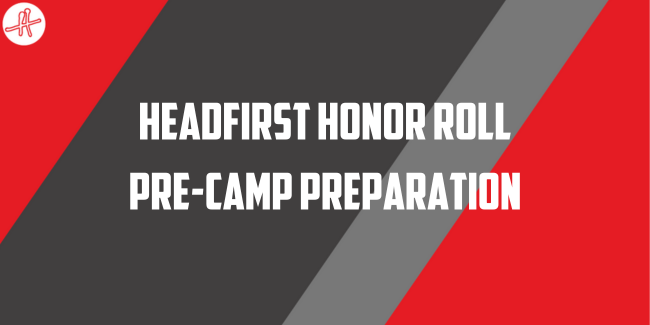


June 8, 2023
Effective communication with college coaches is the foundation upon which you’ll build a lot of your other recruiting efforts. If you are being diligent in your school research and in building out your list of qualities, your first touchpoint with your identified target schools is usually going to be email, prior to seeing them in-person at a showcase or camp.
While there are some guidelines (covered below), it’s important to know that effective coach communication is driven by some core principles. To be effective, all coach communication should be:
If you’re sticking to these three principles at all times, you’re going to be off to a good start in your coach communication efforts.
As part of our Headfirst Recruiting Roadmap, we dive deep into Elevating Your Coach Communication – including a sample email edited by a former college Head Coach and a 45 minute recorded webinar specific to elevated coach communication to break through the noise. If you’re interested in subscribing for $99/year ($100 discount for enrolled families), email us and request to add the subscription to your registration.
Your time leading up to your Honor Roll session is a crucial time in your communication with college coaches – you have the chance now to lay the groundwork of contact to help draw the right eyes to you at camp and facilitate in-person discussions.
Identify your target list of programs
The first step is to do the school research that will help you identify the schools at camp that could be the right fit for you.
Email your target list of coaches with highly-personalized emails
The purpose of these emails is to introduce yourself, express interest in the school and give coaches important information that gives them some insight into your academics and athletics – so keep your emails as concise as possible while accomplishing that three-part purpose.
Understand timelines for coaches’ replies
Between now and camp, coaches are going to be incredibly busy as they close the books on their own spring seasons, graduate their seniors, send their underclassmen away with a summer development program and hit the recruiting trail. That, plus the fact that many of these coaches receive hundreds of emails each day from prospective student-athletes means that they may not get back to you right away (it’s also another key reason to personalize and elevate your coach communication).
Be patient in hearing back from coaches, and don’t lose hope or cross a school off just because you haven’t heard back from the coach in a week.
Parents’/Guardians’ (and other adults’ and/or advisors’) Role in Coach Communication
As you see above, Rule #1 in coach communication is that it be driven by and sent directly from the student-athlete – but this doesn’t mean that parents and other coaches or advisors don’t have a role.
We can’t state strongly enough the recommendation that all communication be written by and sent from the student-athlete. Not only does this show coaches that the player is interested in the school and actively engaged in the recruiting process (and not just the parents), it also demonstrates the maturity and communication skills that coaches are looking for in the players they want to recruit. BUT, parents can play a critical role in the process as both an accountability partner and copy editor/proofreader.
Parents/Guardians: please keep in mind that this is copy-editing, and not copy-re-writing! A college coach is going to be able to tell if you write or re-write this email for your student-athlete. They receive enough emails from high schoolers, and also enough from lawyers, doctors, marketing executives, etc. – who haven’t received this pre-camp preparation – pretending to be high school students that they know the difference.
One of the hallmarks of an Honor Roll Camp experience is the unparalleled access to coaches, and the opportunities that you’ll have to connect and engage with them face-to-face while you’re on-site. To best take advantage of those opportunities, we advise student-athletes to have a plan of attack – and also an open mind. Each phase of the two-day program offers slightly different opportunities to connect with coaches, so putting some intentional thought into how to best use each part of the program can help set you up for success.
Coach Introductions (Day 1)
After the showcase portion on the morning of Day 1, all coaches will be introduced. This is meant to help you find your target schools later on at camp – take note of the coach name (which will also be listed in the Headfirst on-site mobile app) as well as what they’re wearing so you can find them more easily during the coach connection period and between games.
Coach Connection Period (Day 1 & Day 2)
On Day 1 of camp, there will be a dedicated portion of 30 minutes to introduce yourself to college coaches. During these periods of camp, each college coach is assigned to one of the fields. We use our mobile app to let you know which field a particular school/coach is assigned to.
During the Coach Connection Period, players have free reign to go from field to field to connect directly with college coaches.
While this isn’t the time to have a 20-minute chat with a coach, it’s a great time to introduce yourself and give coaches a chance to put a face to your name, and to the notes that they took while you were showcasing earlier on in the day. If you’ve done your pre-camp research, you should know exactly who you are looking to connect with at this time.
It’s also important during this window to be targeted in the coaches you try to connect with, because the 30 minutes will fly by. Don’t use the Coach Connection Period as the only time to talk to college coaches over the course of the two days with us. It can be tempting to head towards “shiny objects” (whether it’s D1 programs, Ivy League programs, or something else) during this window, but you’ll be best served by systematically and efficiently starting conversations with the schools on your list.
The coach connection period on Day 2 of camp is a great time to for continued introductions or follow up with some of the top schools on your list – whether those are ones that you had on your list coming into camp, or some additional schools that you learned about and gained interest in while you were there.
During Games (Day 1 & Day 2)
During each of your games, there will be a different, rotating group of college coaches in your dugout and assigned to your field. Take advantage of this time to both connect with schools on your field that are on your list, and to learn more about and engage with coaches at schools that maybe weren’t on your list. These interactions in the dugout and on the field offer a natural and organic way to learn more about a coach and a school, and to give coaches the opportunity to get to know you as a player.
There are a few keys to success here:
Between and After Games (Day 1 & Day 2)
When your camp team assignment is posted to the Honor Roll on-site mobile app, we’ll also post our coach grouping and rotation document. This will list which coaches are assigned to your game slots and on your fields, and also when specific coaching groups are “roaming”, or not assigned to a particular field.
You can use this document to help find your target coaches while you’re not playing – between games is a great time for conversations with coaches who are “roaming”. Take advantage of this time to connect with coaches – while also recharging, hydrating and getting food before you’re back in action.
Key Takeaways for Effective Coach Communication:
